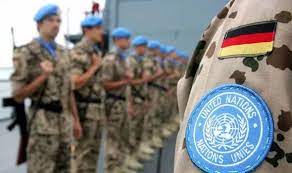APA – Bamako (Mali) – The announcement that German peacekeeping troops would quit Mali in 2024 was made last week by the Minister of Defence, Boris Pistorius after a 48-hour visit to the West African country.
Germany is finally ending its soldiers’ contribution to the United Nations Multidimensional Integrated Stabilisation Mission in Mali (MINUSMA), following disagreements with Mali’s transitional authorities. The withdrawal has been planned since October 2022 and was now made official by the German Defence Minister.
Germany has the largest European contingent in MINUSMA with at least 655 peacekeepers, including 613 men and 52 women.
Its contingent consists of a reconnaissance unit, including the Heron 1 UAV, a helicopter squadron, individual deployments to the mission’s headquarters in Bamako and the airlift based in Niamey, Niger.
Pistorius regretted that the mission was coming to an end, although he did not see it as a failure.
After Mali, Germany could increase its military presence in Niger, where a European counter-terrorism operation will soon be launched.
In addition to Germany, other countries have announced the withdrawal of their contingents from the UN mission earlier than expected.
These are Jordan, Sweden and the United Kingdom of Great Britain and Northern Ireland. These countries have special mobile teams that the UN mission will be deprived of, making it more vulnerable than ever to attack and less of a deterrent to prevent massacres of civilians. Benin and Cote d’Ivoire are following suit.
Germany, like many Western countries, continues to oppose the junta’s new rapproachment with Russia, which has deployed “mercenaries from the Wagner paramilitary group.”
Even if Bamako continues to claim that these are “instructors” sent in the context of bilateral relations. Germany temporarily suspended its operations in Mali last August because of restrictions imposed by the authorities on the overflight of its reconnaissance drones.
These aircraft are essential for the Germans to carry out their operations in complete safety. In June, at least 12 German peacekeepers were injured when a car bomb exploded near a makeshift camp near the village of Ichagara in the Gao region. It was alleged that the Germans had not used these reconnaissance drones to monitor movements near the area of the attack.
In 2022, the situation became more complicated, particularly in July, with the arrest in Bamako of some forty Ivorian soldiers whom the authorities considered to be “mercenaries,” while the UN considered them to be “National Support Elements” (NSE). At the time, the Malian authorities announced the suspension of “all rotational flights of military and police units under the authority of the UN Mission in Mali.” This decision was extended to all other types of aircraft used by MINUSMA in its operations.
Although this decision has been lifted, the Malian authorities have required the UN mission to request permission before taking off with its aircraft. Germany has repeatedly protested against this. Hence the decision to withdraw its contingent from Mali at the end of May 2024.
However, Pistorius issued an assurance that “bilateral cooperation will continue after the withdrawal of German troops from MINUSMA.”
This explains the presence of German Development Minister Svenja Schulze in the delegation. During his stopover in Gao, where his country’s peacekeepers are gathered, the German minister thanked them before declaring that the “orderly dismantling and deconstruction” of the camp housing them would now begin. A military-logistical manoeuvre that will take between 9 and 12 months.
Difficulties encountered by MINUSMA
The departure of the Germans and other MINUSMA troops shows how the group’s room for manoeuvre is being constantly reduced by numerous logistical and operational difficulties. The announced withdrawals represent a loss of more than 2,250 troops, or more than 17 percent of the force’s current strength. In addition, MINUSMA has lost access to certain areas of the country, such as the east and parts of central Mali, due to restrictions imposed by the Malian authorities, whose armed forces operate in these areas.
This situation will further complicate the task of MINUSMA, which remains the deadliest UN peacekeeping mission in the world, with more than 170 peacekeepers killed and 687 injured in hostile acts since July 2013. Of these, at least 103 peacekeepers have been killed and 638 injured in more than 548 Improvised Explosive Device attacks.
It is also the most expensive mission, with an annual budget of over $1 billion. With all these constraints, the viability of MINUSMA is being questioned as its mandate comes up for renewal at the end of June 2023.
MD/ac/lb/as/APA


